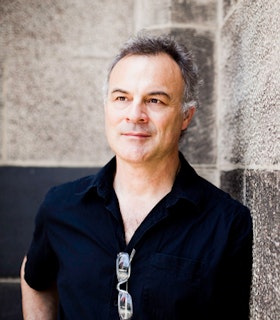Toby Twining

I am extremely grateful for the 2013 grant the FCA awarded to me—a lifesaver and psychological boost to my work... I devoted the largest portion of my time, however, to developing new music notation and techniques for a musical harmony based on pure, complex microtonal intervals. The goal of this aspect of my composing is facility and expressiveness with harmonicity and inharmonicity (the terms au courant for consonance and dissonance at the micro level), microtonal modulation, and microtonal division of the frequency spectrum.
- Toby Twining, January 8, 2014
Artist Statement
I want to innovate with the core elements of the western musical tradition—melody, harmony and rhythm, the primacy of the human voice, teleological structural line, experimentation (especially with tuning), and a kinesthetic sensibility. Computer-assisted rehearsal and performance techniques, and the increased skills of young performers, make it possible to retune our music and make sonorities and chord progressions never heard of before. Music theory, however, must catch up with technology and performers to realize the full potential that retuning offers. I am therefore constantly reinventing ways to make musical accidents and to sketch with them fluidly. The goal is to develop a twenty-first century musical harmony that moves through pitch-space, navigating the neurons of the auditory cortex as though it were a frequency map. I still compose with pencil and paper, sing the notes to myself, try to imagine how unknown pitches will sound melodically or combined, and hope the results appeal to the musically simple and expert alike.
- December 2012
Biography
Twining is a performer, composer, and recording artist. He has traveled musically from playing for rock and jazz bands to composing and performing experimental music for voices with a fresh approach to harmony. When Twining moved to New York in 1987, he initially wrote for modern dance choreographers who wanted the sounds of a new choral music. In 1991, he started Toby Twining Music, which performed in music halls and festivals across the United States and Europe. His avant-garde compositions often feature multiple voices that are layered to create harmonic patterns. Twining incorporates elements of diverse musical styles and eschews lyrics to allow further experimentation.
In 2011, Cantaloupe Music released his album Eurydice, which began as the score of mostly wordless vocal music for the play of the same name by Sarah Ruhl. Eurydice is written for four vocalists and a cellist. His other recordings include Shaman (1994), The Little Match Girl (1996), Emily Dickinson's Birthday Pizza (1996), and Chrysalid Requiem (2002). During his FCA grant year, Twining completed four choral pieces Mizmor Aleph Kith, Lincoln the Musician, and Rerrara Redux. Twining's instrumental music has been recorded by pianist Margaret Leng Tan and cellist Matt Haimovitz.
Twining's work has been performed at venues including the Nicholas Roerich Museum, the Festival of Spiritual Music for the New Millennium, Amsterdam; The Tractor Tavern, Seattle; Bang-on-a-Can Summer Music Festival, North Adams, Massachusetts; The Wilma Theatre, Philadelphia; Roulette; American Festival of Microtonal Music; and Eagle Rock Festival in Los Angeles.
Prior to his Grants to Artists, Twining received a Pew Fellowship (2004), a Barrymore Award for Outstanding Original Music from the Theatre Alliance of Greater Philadelphia (2008), a Commissioning Music/USA Award from New Music USA (2011), and a John Simon Guggenheim Memorial Foundation Fellowship (2011). Twining is a co-founder of Arts on the Edge Wolfeboro and director of Toby Twining Music, Brooklyn. Twining received a B.M. from the University of Illinois at Urbana-Champaign, and an M.A. from Wesleyan University.